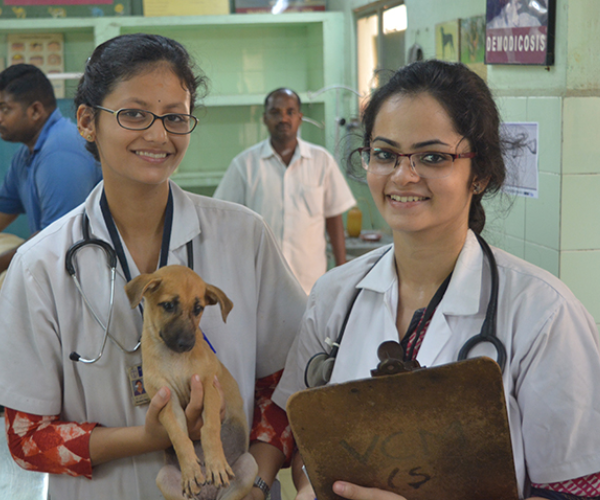Duration: 2 years. Fees will be charged per semester.
Veterinary education in India is an essential field of study that prepares students to become skilled professionals in the care and treatment of animals. It plays a crucial role in safeguarding the health and well-being of animals, ensuring food safety, and contributing to the overall welfare of society. In this article, we will delve into the various aspects of veterinary courses in India, including the educational system, eligibility criteria, admission process, curriculum, career opportunities, and the importance of veterinary science.
Eligibility Criteria
To pursue a career in veterinary science, aspirants must meet specific eligibility criteria, which may vary slightly from one institution to another. In general, the following criteria are commonly observed:
Veterinary education in India is an essential field of study that prepares students to become skilled professionals in the care and treatment of animals. It plays a crucial role in safeguarding the health and well-being of animals, ensuring food safety, and contributing to the overall welfare of society. In this article, we will delve into the various aspects of veterinary courses in India, including the educational system, eligibility criteria, admission process, curriculum, career opportunities, and the importance of veterinary science.
Introduction to Veterinary Education
Veterinary education in India is primarily offered through a network of government and private institutions, including universities and colleges. These institutions provide a comprehensive curriculum and training that equips students with the knowledge and skills necessary to diagnose, treat, and prevent diseases in animals. The courses are designed to cover a wide range of species, including both domestic and wild animals.
Eligibility Criteria
To pursue a career in veterinary science, aspirants must meet specific eligibility criteria, which may vary slightly from one institution to another. In general, the following criteria are commonly observed:
Educational Qualifications: Candidates should have completed their 10+2 education with a strong background in science, particularly in subjects such as Physics, Chemistry, Biology, and English.
Minimum Marks: Many veterinary colleges and universities require candidates to have a minimum aggregate score in their 10+2 examinations, typically around 50% to 60%.
Entrance Exams: Admission to veterinary courses in India is highly competitive and is generally based on performance in national or state-level entrance exams. The most common entrance exam for veterinary studies in India is the All India Pre-Veterinary Test (AIPVT).
Age Limit: There is usually an age limit for candidates applying for veterinary courses, which is typically around 25 years. However, this limit may vary among institutions.
Career Opportunities in Veterinary Science:
A degree in veterinary science opens up a wide range of career opportunities in India. Some of the popular career paths for veterinary graduates include:
- Veterinarian: Working in private clinics, hospitals, or government veterinary hospitals to diagnose, treat, and care for animals.
- Livestock Inspector: Monitoring and ensuring the health and well-being of livestock in farms and dairy industries.
- Research and Development: Conducting research in animal sciences, contributing to advancements in veterinary medicine, and developing new treatments and vaccines.
- Wildlife Conservation: Working with wildlife organizations and national parks to protect and conserve endangered species.
- Teaching and Academia: Pursuing a career in teaching and research at universities and colleges.
- Pharmaceutical Industry: Joining pharmaceutical companies to develop and market veterinary drugs and products.
- Government Services: Working in government departments related to animal husbandry, agriculture, and public health.
- Poultry Farming: Managing and overseeing the health and well-being of poultry animals.
- Pet Care and Management: Providing pet care services, including grooming, boarding, and training.
- Animal Nutritionist: Advising on the dietary needs of animals and developing specialized animal feed.
The Importance of Veterinary Science in India
Veterinary science holds immense importance in India for several reasons:
- Economic Contribution: India has a significant agricultural sector, and a substantial portion of the population relies on livestock for their livelihood. Veterinary professionals play a vital role in maintaining the health and productivity of these animals, contributing to the nation’s economy.
- Food Safety: Ensuring the health and hygiene of food-producing animals is critical for food safety. Veterinary experts help in monitoring and controlling diseases that can be transmitted from animals to humans (zoonotic diseases).
- Wildlife Conservation: India is home to a rich and diverse wildlife population. Veterinary experts are crucial in protecting and conserving this biodiversity.
- Animal Welfare: Veterinary professionals advocate for the welfare of animals and work to prevent cruelty and mistreatment.
- Research and Innovation: Research in veterinary science leads to the development of new treatments, drugs, and technologies that benefit both animals and humans.
- Public Health: Veterinary professionals are an essential part of public health programs, especially in preventing and controlling diseases that can spread from animals to humans.





Leave a Reply